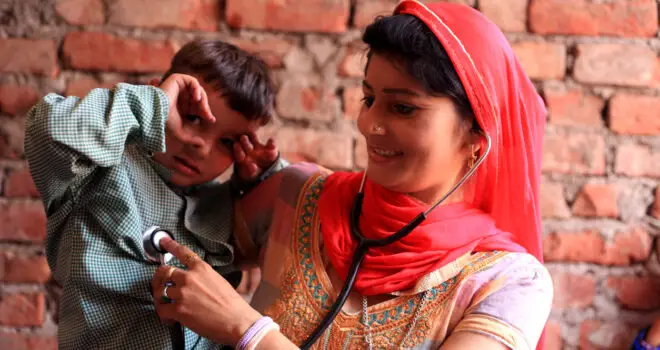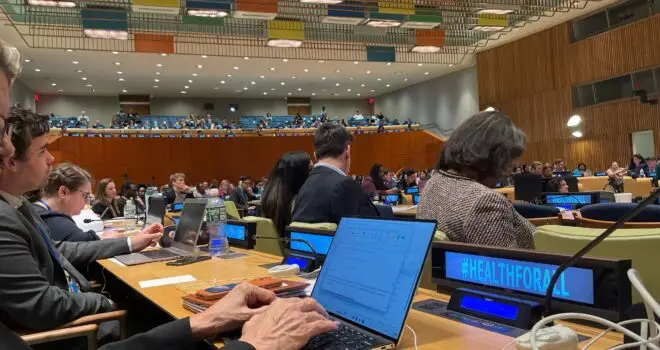Despite major reductions, cardiovascular disease (CVD) continues to be the world’s number one killer, representing over one-third of all causes of mortality globally. Eighty percent of these deaths occur in low- and middle-income countries (LMICs) where the mortality burden is predicted to rise even further. Universal Health Coverage (UHC) Day serves as an annual reminder of the significant disparities that persist in accessing essential services for cardiovascular disease (CVD) within and across countries and the urgent need to prioritize CVD in national strategies to achieve UHC, if we are serious about reducing the devastating impact that CVD is having on individuals and communities.
While numerous inexpensive and cost-effective interventions for preventing and managing CVDs exist, far too many individuals lack access to them. Access to hypertension screening and treatment, for instance, remains alarmingly inadequate in LMICs: It has been estimated that only 30% of the people diagnosed with hypertension have access to treatment for their condition, putting them at risk of developing more serious conditions, such as stroke or ischaemic heart disease. In LMICs, CVD services are often unavailable or when they are available, they are generally unaffordable, pushing individuals and households to choose between their health and basic needs, such as food and education. These are choices that no one should be forced to make. Health is a fundamental human right that everyone should be entitled to, regardless of their geographical location or ability to pay.
Despite evidence that lower expenditures on health as a percentage of GDP are correlated with higher mortality due to CVD, the proportion of countries spending at least the recommended rate of 5% of their GDP on health remains inadequate, resulting in a lack of progress in achieving UHC, with dire consequences on CVD morbidity and mortality. In addition, most of the interventions that would dramatically reduce the burden of CVD can be delivered at primary health care (PHC), which is the cornerstone of UHC. Nevertheless, despite lessons learned during the COVID-19 pandemic on the catastrophic consequences of a weak PHC system, most governments are still allocating too new funds to PHC.
As we commemorate UHC Day, it is imperative that we unite our efforts in advocating for the inclusion of CVD in national strategies to achieve UHC. To this end, the World Heart Federation and the Global Coalition for Circulatory Health (GCCH) published a policy brief calling on governments to take concrete actions to expand coverage of essential health services for CVD to all by 2030, to reduce the financial burden on individuals and households resulting from their health condition. As the fulcrum of UHC, governments should scale up efforts to strengthen PHC, so CVD services can be delivered closer to the communities who need them and be made accessible to everyone, everywhere.
Finally, in the process of expanding UHC, governments should consider covering a number of evidence-based cost-effective interventions for CVD, included in the policy brief, that with minimal government investment would ensure improved cardiovascular health outcomes. These interventions include, but are not limited to, conducting blood pressure, diabetes and lipid screening, as well as ensuring availability of continuous treatment for hypertension, diabetes and high cholesterol coupled with counselling on healthy diet, physical activity, tobacco cessation and alcohol reduction. With minimal investment, implementing these simple interventions can help the world make strides in combating the leading cause of death.
The World Heart Federation (WHF) will continue to support its members from around the world in advocating for greater commitment to addressing CVD. Together, we are exploring innovative ways to guarantee access to prevention, diagnostics, and treatment for cardiovascular disease as an integral component of UHC. Through national advocacy roundtables, roadmaps, policy briefs and capacity-building initiatives, the WHF aims at fostering collaboration on a global scale to ensure access to CVD services is not a luxury, but a fundamental right accessible to all, regardless of their circumstances.
As we mark UHC Day, we encourage the global community to scale up efforts to reduce gaps in CVD care worldwide. By prioritizing CVD management within UHC and implementing cost-effective interventions, we can pave the way towards a healthier, more equitable world where quality healthcare is a right, not a privilege.


